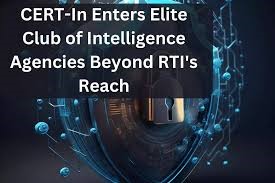
Cyber Security, CERT-In & RTI Act

27.11.2023
Cyber Security, CERT-In & RTI Act , Current Affairs , RACE IAS : Best IAS Coaching in Lucknow
|
For Prelims: Cybersecurity,Cases of Cyber-attacks in India,About Indian Computer Emergency Response Team, For Mains paper :About Right to Information Act, 2005,Objective,Significance |
Why in the news?
Recently,The Central government has exempted the Indian Computer Emergency Response Team (CERT-In) from the purview of the Right to Information Act, 2005.
What is Cybersecurity?
- Computer security, Cybersecurity or Information Technology Security is the protection of computer systems and networks from cyber-attacks that cause information disclosure, theft of or damage to their hardware, software, or electronic data.
Cases of Cyber-attacks in India:
- As per the government data presented in the Parliament, nearly 1.16 million cases of cyber-attacks in India were reported in 2020, marking an average of 3,137 cyber security issues reported every day of the year.
- The Internet Crime Report by the FBI revealed that India is ranked third in the world among the top 20 countries being victimized by cyber-crimes.
- At present, India does not have any dedicated cyber security law.
About Indian Computer Emergency Response Team (CERT-In):
- CERT-In has been operational since 2004.
- It is an office within the Ministry of Electronics and Information Technology.
- It is the nodal agency to deal with cyber security threats like hacking and phishing. It strengthens security-related defence of the Indian Internet domain.
- In the Information Technology Amendment Act, 2008, CERT-In has been designated to serve as the national nodal agency to perform various functions in the area of cyber security
- It performs following functions in the area of cyber security:
○Collection, analysis and dissemination of information on cyber incidents
○Forecast and alerts of cyber security incidents
○Emergency measures for handling cyber security incidents
○Coordination of cyber incident response activities
○Issue guidelines, advisories relating to information security practices, procedures, prevention, etc.
- The CERT-In now joins the list of 26 other intelligence and security organisations, which are already exempted from the purview of the Act.
About Right to Information Act, 2005
- The RTI Act came into force with effect from October 2005.
- The Right to Information (RTI) is an act of the Parliament of India which sets out the principles and techniques in regards to citizens’ right to information. It supplanted the previous Freedom of Information Act, 2002.
- It is an initiative taken by the Department of Personnel and Training, Ministry of Personnel, Public Grievances and Pensions.
- The basic object of the Act is to empower the citizens, promote transparency and accountability in the working of the Government, contain corruption, and make our democracy work for the people in a real sense.
- The RTI Act, 2005 extends to the whole of India.
- All bodies, which are constituted under the Constitution or under any law or under any Government notification or all bodies, including NGOs, which are owned, controlled or substantially financed by the Government are covered.
- All private bodies, which are owned, controlled or substantially financed by the Government are directly covered.
Objective-
- To secure access to information for the citizens.
- To empower citizens, promote transparency and accountability in the working of the Government,
- To contain corruption, and make our democracy work in the real sense
Significance:
- It protects the fundamental rights to Freedom of Expression and Speech under Article 19(1)(a) and Right to Life and Personal Liberty under Article 21 guaranteed by the Constitution.
- The authorities under RTI Act 2005 are called public authorities.
- The Public Information Officer (PIO) or the First Appellate Authority in the public authorities perform a quasi-judicial function of deciding on the application and appeal respectively.
Source:Indian Express